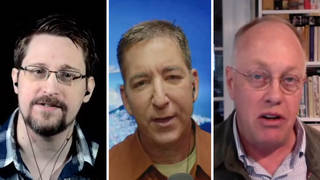
Related
Guests
- James Riseninvestigative journalist with The New York Times. In 2006, he won a Pulitzer Prize for his stories about warrantless wiretapping by the National Security Agency. He has been pursued by both the Bush and Obama administrations as part of a six-year leak investigation into his previous book, State of War: The Secret History of the CIA and the Bush Administration. His new book is Pay Any Price: Greed, Power, and Endless War.
New York Times investigative reporter James Risen faces jail time if he refuses to name a whistleblowing source, but he insists the actual whistleblowers, including Edward Snowden, are “much more courageous that we reporters are.” Risen won a Pulitzer Prize for his reporting about warrantless wiretapping of Americans by the National Security Agency. “We revealed the framework for … how the Bush administration turned the NSA on the American people,” Risen says. He argues Snowden revealed that “under Obama and in the years since we had first written about it, the American people had become much more of an online citizenry … as a result, the NSA had grown dramatically in their ability to watch the online presence of Americans.”
Transcript
AMY GOODMAN: So, you have covered whistleblowers for years. They’re your sources for years. And now, in a sense, you have become one yourself for press freedom. And you write about, in Pay Any Price, these remarkable people—
JAMES RISEN: Yeah.
AMY GOODMAN: —who face all odds, like Bill Binney and others.
JAMES RISEN: Yeah. Well, I really respect them much more. They face much more than I ever do. They’re much more courageous, I think, than we reporters are, you know, especially me. I mean, Diane Roark, who I talked about a little bit before, is really one of my heroes. She went—she did everything that you would expect someone to do in the government. And to me, her case is a perfect example of why Edward Snowden had to do what he did, that he could never have gone through the system. People say, “Oh, why didn’t he go through the system?” She tried to go through the system and was persecuted for it.
AMY GOODMAN: What about Edward Snowden?
JAMES RISEN: I think he’s a whistleblower, you know, and I think he’s in the same tradition of whistleblowers.
AMY GOODMAN: The New York Times recently said they would consider him, call him a whistleblower. Can you talk about the process, the decision that the Times made in using that terminology for him?
JAMES RISEN: I didn’t know that. I didn’t know that that was an issue. That’s interesting. I just think he is. I mean, I think it’s just a simple fact. He has revealed lots of information that’s led to a national debate about the extent of electronic surveillance in the United States, and has, you know, paid a heavy price for it. He’s had to go into exile. And I think anyone who thinks he could have done what he’s done and stayed in the United States is fooling themselves.
AMY GOODMAN: Do you think he should be allowed back into the United States and not face trial?
JAMES RISEN: Yes, I do.
AMY GOODMAN: What do you think he has contributed?
JAMES RISEN: As I said, he has sparked a new national debate over the extent of surveillance. What I think he contributed was—you know, in our stories and other people’s stories early on about the NSA, we revealed the framework, the framework for what the Bush administration had done, that they had turned the NSA on the American people. What I think Snowden revealed, the basic thing that I think he revealed, is that under Obama and in the years since we had first written about it, the American people had become much more online, an online citizenry. We were now completely digital, with Facebook and Twitter and all of these things. And as a result, the NSA had grown dramatically in their ability to watch the online presence of Americans, much more than they had just a few years earlier in the Bush administration. And so, what I think he revealed was the dramatic expansion, in just a few short years, of the NSA’s ability to shadow the online presence of Americans. And that was a real contribution.
AMY GOODMAN: You have a son who’s a reporter?
JAMES RISEN: Yes, yeah, my oldest son, Tom, is a reporter at U.S. News & World Report, yeah.
AMY GOODMAN: And so, what is the legacy you want to pass on to him?
JAMES RISEN: Well, I want to have a free press. I want to have him—I want it to be where he can still develop sources and do aggressive reporting in the same way I did throughout my career. I don’t want young reporters to face a situation or a climate where they’re much more constrained in what they can write about than I had in my career.
AMY GOODMAN: And you’re willing to go to jail for this?
JAMES RISEN: Yes. I think that’s the one thing I can leave to my son.
AMY GOODMAN: Well, I want to thank you for being with us. The Times might have just come out with an editorial calling Edward Snowden a whistleblower.
JAMES RISEN: Oh, OK, OK.
AMY GOODMAN: But, James Risen is an investigative journalist with The New York Times, Pulitzer Prize-winning reporter. His new book is out today; it’s called Pay Any Price: Greed, Power, and Endless War.












Media Options